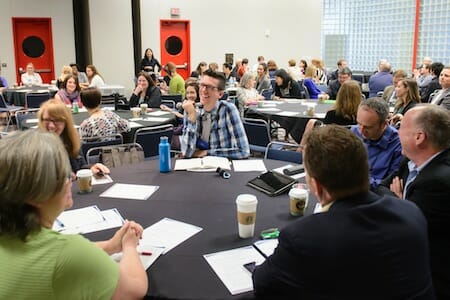5 Things You Should Know About Using Data for Good
This post is by Miriam Young, communications specialist at DataKind.
As someone who has built her career engaging business, technology and data professionals in pro bono service to change the world, I could not have been more excited to participate in this year’s Conference on Volunteering and Service, held a couple of weeks ago in Houston, as a panelist for the Using Big Data to Advance Social Missions session. In the session, we explored the many ways that nonprofits can use big data to advance their missions.
 Clockwise from top left, Diane Melley, Crystal Barnes, Katherine Price, Corey Marshall and Miriam Young
Clockwise from top left, Diane Melley, Crystal Barnes, Katherine Price, Corey Marshall and Miriam YoungWhen we talk about big data, we’re really talking about the scale of data generated by everything around us at all times. Today, data is constantly being produced from a variety of sources at an amazing velocity, volume and variety. It comes from cell phones, social media accounts, websites, satellites – you name it. But to extract meaningful value from big data, you need analytics capabilities, tools and skills. That’s where the volunteers come in.
Joining me for this discussion was a power panel (pictured above), including Crystal Barnes, vice president of corporate social responsibility at Nielsen; Corey Marshall, director of Splunk4Good; Katherine Price, chief service officer of the City of Houston; and our fearless leader, Diane Melley, vice president of global citizenship initiatives at IBM, moderating the session.
If you couldn’t make it, here are my top five takeaways.
5. Full house for an 8:30 a.m. panel on data!? Who are these people?
 Conference on Volunteering and Service attendees interact at the Using Big Data to Advance Social Missions session.
Conference on Volunteering and Service attendees interact at the Using Big Data to Advance Social Missions session.My kind of people. Professionals starting the day equally excited about changing the world using volunteer power as they are using the power of data. We had a mix of more than 80 corporate social responsibility (CSR) folks from companies like Humana, NetSuite and Capgemini, and nonprofit professionals from groups like VolunteerMatch, KaBOOM! and United Way, which made for a lively discussion about the ins and outs of using data for good.
4. There is humanity and a story behind the numbers.
Panelists and audience members alike shared many powerful case studies of how data can be used for the greater good:
- Splunk4Good analyzed text messages from Hurricane Sandy to help the Federal Emergency Management Agency Innovation Team inform resource deployment for natural disasters.
- Nielsen helped the United Nations World Food Programme more efficiently collect data to inform its work battling hunger by using mobile phone surveys.
- The City of Houston is rallying citizens in a series of hackathons to help design solutions to make government services more efficient.
3. And what if my organization/the nonprofits we serve don’t have any data?
Got a website? You got data. Got social media accounts? You got data. There's census data to learn more about the populations you serve, open data to make your city smarter, crowd-sourced data to give you on-the-ground insights, information from websites and PDFs that can be scraped into a usable format.
But you know what? Forget about data. Start with the question you want to answer.
Our project with GiveDirectly to measure poverty levels of villages in Kenya and Uganda using satellite imagery is a perfect example. They came with a question: Which villages should we expand to next? Our volunteers used satellite data to create a novel solution to answer it. You don’t need to know what dataset might be useful – you just need to know what question will help advance your mission.
P.S. We’d love to help you with this! Learn more about what we offer.
P.P.S. And if you’re looking to brush up on your skills, check out some of our favorites helping nonprofit professionals do just this: Data Analysts for Social Good and the Do Good Data conference, Idealware and NTEN’s Data Community of Practice, and SSIR’s Data on Purpose conference.
2. Measurable outcomes. Say it again now.
Kudos to Crystal Barnes of Nielsen for hammering home a critical ingredient for any volunteer or data-for-good initiative – measurable outcomes. Before you think about the data or the tools, you must first surface the key question, need or opportunity you’re trying to address. Then decide how you’re going to measure what success looks like. Measurable outcomes help us learn, fail fast and iterate to do even better the next time.
1. What if we all worked together?
Measurable outcome of a successful panel? One that inspires action after everyone goes home. My favorite moments of the session were when opportunities for collaboration surfaced.
The workshop helped spark new ideas for folks and we’ve already heard from a few people thinking of ways they can join the Data for Good movement – from Blue Cross Blue Shield to our friends at A Billion + Change to NetSuite – who are thinking about how they can connect project managers to nonprofits to help in the “problem discovery” and scoping process.
Here’s to many more gatherings that help surface more collaborations – the only way forward is together.
If you want to learn more about the power of big data for social good, Points of Light has packaged all the tools you need to get started on this resources webpage. Or just reach out to us at DataKind for more personalized support!
